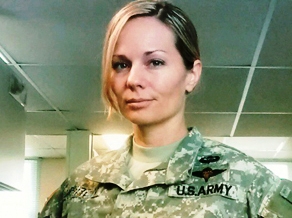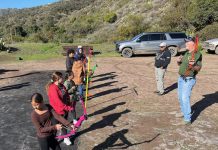Imagine you were once a high school quarterback. That’s great. But high school is over. Now what are you going to do with the rest of your life?
That’s one of the issues facing veterans after their military careers end, according to Sgt. 1st Class Jen Dreizehn, U.S. Army (retired), founder of the Fit4Valor ministry on Catalina Island.
Fit4Valor is, for now, a faith-based program of Avalon’s Singing Waters Christian Center. It’s focus: helping veterans work out what to do with the rest of their lives.
Imagine you were once a high school quarterback. That’s great. But high school is over. Now what are you going to do with the rest of your life?
That’s one of the issues facing veterans after their military careers end, according to Sgt. 1st Class Jen Dreizehn, U.S. Army (retired), founder of the Fit4Valor ministry on Catalina Island.
Fit4Valor is, for now, a faith-based program of Avalon’s Singing Waters Christian Center. It’s focus: helping veterans work out what to do with the rest of their lives.
“You’re not just who you were,” Dreizehn said.
If the start up ministry proves successful, Dreizehn said it would spin off to become a separate non-profit ministry.
“We’re going to see how it goes and I think it’s going to come on strong,” she said.
In related news, there’s going to be a community meeting about the Fit4Valor ministry at 5 p.m., Sunday, Dec. 3, at the Singing Waters center at 346 Catalina Ave.
Dreizehn came to Catalina as a teenager. She left at 18. She joined the U.S. Army, where she served for 20 years. By the conclusion of her career, she had attained the rank of sergeant first class. Dreizehn worked in transporation, served as a parachute rigger and also worked in mortuary affairs.
She returned to Catalina two years ago.
Now she has founded Fit4Valor. “The key focus is on helping them to figure oh, ‘OK, what do I do now that I’m not in the military,’” she said.
“We give them a lot of alone time,” Dreizehn said.
Participating Fit4Valor veterans share issues in group discussions. At night, they have dinner together and talk.
“Each veterans goes through different stuff and each one processes it differently,” she said.
Dreizehn described the program as a way to build vets up. She said they have a hard time getting back to the real world.
“The only reason we’re focusing on the military is because it’s a passion of mine,” Dreizehn said.
Fit4Valor is developing trips to the island for veterans. Jan. 14, 2018, will be the official kickoff.
According to the ministry’s website, “Fully immerse yourself in 12 days and 11 nights all inclusive retreat covering all the the core teachings.
One day of fasting and one service day included. Camping, hiking, kayaking, snorkeling included and unlimited days of one on one prayer counseling available.”
Avalon embraces veterans
The Avalon community respects veterans. When Dreizehn came home from Iraq, the entire VFW post greeted her. “Civilian or military, everyone (here) loves each other,” she said.
Dreizehn said the Avalon community took care of her parents while she was overseas. “This community really steps up and takes care of you,” she said.
According to Dreizehn, the vast majority of the families that live on the Island include veterans of the Vietnam War, though she expects their numbers to decrease as people get older.
It’s not clear how many veterans are living in Avalon. The latest Census Bureau data, with a margin of error of plus or minus almost 56 percent, isn’t reliable.
In addition to the Avalon community, the Island itself appears to comfort returning veterans. Dreizehn said one of her friends in the service told her that he comes to Catalina after he deploys.
Dreizehn said that veterans, especially combat vets, are constantly on alert. She said most people in town would say that going into the interior has a calming effect.
While there are more positives than negatives to being a veteran in Avalon, Island vets do have some unique issues.
Uniquely Island issues
Dreizehn said Catalina veterans have a lot of issues related to going to the Veterans Affairs hospital on the mainland in Long Beach.
Until recently, Veterans Affairs did not allow Island vets to go to the Catalina Island Medical Center because Catalina is less than 50 miles from the Long Beach VA. According to Dreizehn, said local vets had to get the VA to rewrite the rules so they can get local health services if they are more than 50 miles away or if there is an obstacle such as the ocean.
Another issue: the VA is slow to reimburse veterans for the cost of traveling to the mainland for health care. She said just going to the Long Beach VA every week uses an entire commuter book. Dreizehn said the VA still doesn’t pay for a “life flight,” an emergency medical evacuation off the island, either.
That issue isn’t unique to veterans. As the Islander reported in 2015, health insurance may pay a small part of a life flight. The cost can range from $15,000 to $20,000.
“Also, (there is a) lack of adequate conseling,” Dreizehn said.
She said veterans can go to the Catalina Island Mecial Cetner to talk to a psychologist online.
“A lot of them are like, ‘I don’t want to talk to a TV,’” she said.
For more information about Fit4Valor, visit www.fit4valor.com or email Dreizehn at fit4valor@gmail.com.











